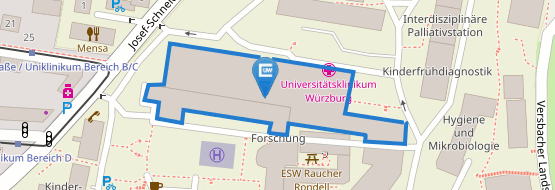Prof. Dr. Franziska Faber
Research
Enteric infections and their clinical outcome are often associated with underlying microbial dysbiosis. Clostridioides difficile – being a leading cause of antibiotic-associated diarrhea – is a prime example. Therefore, a mechanistic understanding of virulence regulation in the context of pathogen-commensal interactions is paramount for the development of novel therapeutics.
The production of toxins and the ability to form antibiotic-resistant spores are the major virulence factors in C. difficile that contribute to significant morbidity and mortality and to high recurrence rates in patients. Their production is tightly regulated by metabolic signals whose abundance and composition throughout the infection cycle is shaped by the gut microbial community.
In our lab, we combine deep RNA-sequencing based approaches with RNA biology, biochemical, genetic and microbiology techniques to discover and mechanistically characterize non-coding RNAs and their RNA-binding protein partners involved in virulence gene regulation.
We are also interested in how the activities of these regulators is shaped by microbial and host signals. To better understand this cross-talk, we take a bottom-up approach by studying individual pathogen-commensal interactions integrating microbiology, genetic, advanced cell culture and metabolomics approaches.
The overarching goal of the Faber group is to identify and functionally characterize novel RNA-based mechanisms of virulence regulation that can be exploited as therapeutic targets.
Fuchs M, Lamm-Schmidt V, Lenče T, Sulzer J, Bublitz A, Wackenreuter J, Gerovac M, Strowig T, Faber F (2023)
A network of small RNAs regulates sporulation initiation in C difficile
EMBO J doi:10.15252/embj.2022112858
Fuchs M*, Lamm-Schmidt V*, Sulzer J, Ponath F, Jenniches L, Kirk JA, Fagan RP, Barquist L, Vogel J, Faber F (2021)
An RNA-centric global view of the clinically important bacterium Clostridioides difficile reveals broad activity of Hfq in a Gram-positive species
PNAS doi:10.1073/pnas.2103579118
Lamm-Schmidt V, Fuchs M, Sulzer J, Gerovac M, Hör J, Dersch P, Vogel J, Faber F (2021)
Grad-seq identifies KhpB as a global RNA-binding protein in Clostridioides difficile that regulates toxin production
microLife uqab004:10.1093/femsml/uqab004
Tiffany CR, Lee JY, Rogers AWL, Olsan EE, Morales P, Faber F*, Bäumler A* (2021)
The metabolic footprint of Clostridia and Erysipelotrichia reveals their role in depleting sugar alcohols in the cecum
Microbiome 2021 doi: 10.1186/s40168-021-01123-9
Faber F, Thiennimitr P, Spiga L, Byndloss MX, Litvak Y, Lawhon S, Andrews-Polymenis HL, Winter SE, Bäumler AJ (2017)
Respiration of microbiota-derived 1,2-propanediol drives Salmonella expansion during colitis
PLoS Pathogens 2017 13(1):e1006129
Faber F, Tran L, Byndloss MX, Lopez CA, Velazquez EM, Kerrinnes T, Nuccio SP, Wangdi T, Fiehn O, Tsolis RM, Bäumler AJ (2016)
Host-mediated sugar oxidation promotes post-antibiotic pathogen expansion
Nature 2016 534(7609):697-9
Fanziska Faber
![[Translate to Englisch:] [Translate to Englisch:]](/fileadmin/_processed_/f/d/csm_Faber_c4120e7c67.jpg)
Dr. Jessica Brock

Manuela Fuchs
![[Translate to Englisch:] [Translate to Englisch:]](/fileadmin/_processed_/3/7/csm_SON01322_Manu_72f859ede4.jpg)
Sara Giddins
![[Translate to Englisch:] [Translate to Englisch:]](/fileadmin/_processed_/8/f/csm_Sara_Giddin_AG_FF_e51e80769a.jpg)
Vanessa Lamm-Schmitt
![[Translate to Englisch:] [Translate to Englisch:]](/fileadmin/_processed_/e/9/csm_SON01317_Vanessa_3ad206fba6.jpg)
Johannes Sulzer
![[Translate to Englisch:] [Translate to Englisch:]](/fileadmin/_processed_/9/d/csm_Johannes_S_24caecc01e.jpg)
Janet Wackenreuter

Anna Zweyer
![[Translate to Englisch:] [Translate to Englisch:]](/fileadmin/_processed_/3/5/csm_Noehren_Anna_c_HIRI_Nik_Schoelzel_aa75f97560.jpg)




